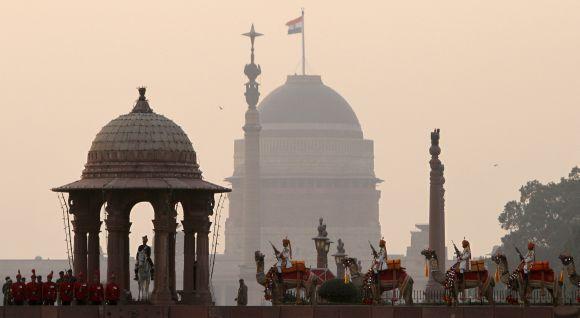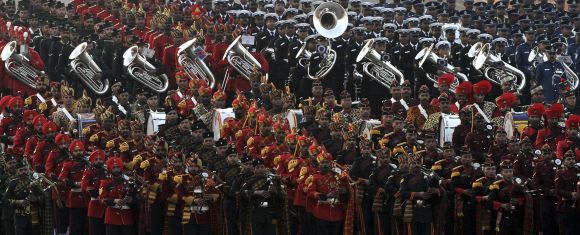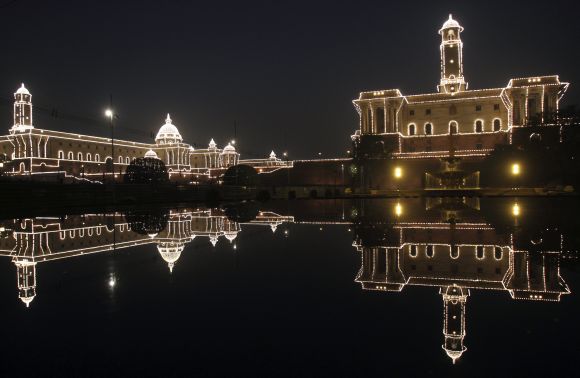 | « Back to article | Print this article |
PHOTOS: R-Day celebrations end with Beating Retreat
A 'jugalbandi' of tabla and shehnai along with military bands rendering 'Vandemataram' mesmerised the audience at Beating Retreat ceremony on Sunday, bringing the curtains down on Republic Day celebrations.
The celebrations came to a close as the Sun went down the Raisana Hills which was then lit up after lilting martial tunes and massed pipes and drum bands reverberated the air enthralling those gathered at the function at the historic Vijay Chowk.
Rendition of 'Vandemataram' in a fusion of western and Indian classical style along with tabla and shehnai titled 'Renaissance' was the highlight of the ceremony. This was the first time that tabla and shehnai were included in the hour-long show.
Click NEXT to see more PHOTOS...
PHOTOS: R-Day celebrations end with Beating Retreat
The performance by the pipe and drum band members left the audience that included President Pratibha Patil, Vice President Hamid Ansari and Prime Minister Manmohan Singh enchanted.
The ceremony saw 35 bands from three armed services in their colourful ensembles playing tunes like 'Sare Jahan se Achha' penned by Iqbal and 'Abide with Me', the eternally enchanting hymn which was a favourite tune of Mahatma Gandhi.
Indian tunes were the flavour of the ceremony this year as 15 of the 22 performances have been composed by Indian musicians while just seven popular tunes by foreigners were retained, interspersed five times with 'Fanfare', a collage by buglers, and 'Drummers Call', a traditional performance by drummers.
Patil, the chief guest of the function and supreme commander of the armed forces, came from Rashtrapati Bhawan preceded by mounted presidential bodyguards at Vijay Chowk, where her arrival was sounded by 14 trumpeters, 32 buglers and 14 echo buglers followed by playing of national anthem and a tune 'Parameshwar', composed by Captain Mahendra Das.
Click NEXT to see more PHOTOS...
PHOTOS: R-Day celebrations end with Beating Retreat
The band members, in their reds, olive greens, orange and navy blues, played the tunes for an hour before the flag was lowered amid retreat by buglers.
The Rashtrapati Bhawan, the Parliament House, the North and South Blocks along with other official buildings in Raisina Hills lit up on the occasion.
The military bands of Air Force and Navy followed the massed pipes and drums bands of the Army which played six tunes -- 'General Tappy', 'Chipli Naach', 'The Hundred Pipers', 'Louden's Bonnie Woods & Brass', 'The High road to Linton', and 'Queen of Hill'.
The Air Force and Navy bands played six tunes -- Everest, Skylark, Rhythm of the Waves, Twilight, Renaissance and Sea Patrol.
Massed military bands of the Indian Army also played 'Nakhreli Joban', 'Almora', 'Sarangi', 'Post Horn Gallop' and 'Redetzky March'.
All the massed military bands then played the 'Vijayee Himalaya' and 'Drummer Call' which was followed by 'Abide with Me', the eternally enchanting hymn, a favourite tune of the Father of the Nation, Mahatma Gandhi. The Buglers then retreated to the sound of 'Sare Jahan se Achha'.
Beating the Retreat is a military ceremony dating back to16th century England and was first used to recall troops when they ceased fighting, sheathed their arms and withdrew from the battlefield to return to their camps at sunset.
The ceremony here traces its origins to the early 1950s when Major Roberts of the Indian Army indigenously developed the unique ceremony of display by the massed bands.
Click NEXT to see more PHOTOS...
PHOTOS: R-Day celebrations end with Beating Retreat
As the tricolour was lowered by a military personnel, camel-mounted troops on regalia atop the Raisina Hills retreated along with the bands and the corridors of power were lit up in magnificent lights bringing the 63rd Republic Day celebrations to a conclusion.
Following this, the Rashtrapati Bhawan, Parliament House, North and South Blocks along with other official buildings in the Central Vista lit up, leaving the audience spellbound.
Beating Retreat is a military ceremony dating back to16th century England and was first used to recall troops when they ceased fighting, sheathed their arms and withdrew from the battlefield to return to their camps at sunset.
The ceremony here traces its origins to the early 1950s when Major Roberts of the Indian Army indigenously developed the unique ceremony of display by the massed bands.
As the tricolour was lowered by a military personnel, camel-mounted troops on regalia atop the Raisina Hills retreated along with the bands and the corridors of power were lit up in magnificent lights bringing the 63rd Republic Day celebrations to a conclusion.



